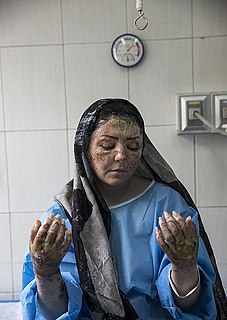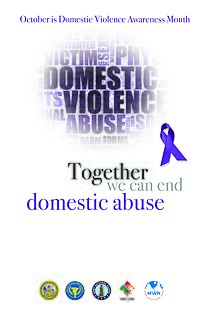Related Research Articles
Sexual violence is any sexual act or attempt to obtain a sexual act by violence or coercion, acts to traffic a person or acts directed against a person's sexuality, regardless of the relationship to the victim. It occurs in times of peace and armed conflict situations, is widespread and is considered to be one of the most traumatic, pervasive, and most common human rights violations.

Violence against women (VAW), also known as gender-based violence and sexual and gender-based violence (SGBV), are violent acts primarily or exclusively committed against women or girls. Such violence is often considered a form of hate crime, committed against women or girls specifically because they are female, and can take many forms.
Dating abuse or dating violence is the perpetration or threat of an act of violence by at least one member of an unmarried couple on the other member in the context of dating or courtship. It also arises when one partner tries to maintain power and control over the other through abuse or violence, for example when a relationship has broken down. This abuse or violence can take a number of forms, such as sexual assault, sexual harassment, threats, physical violence, verbal, mental, or emotional abuse, social sabotage, and stalking. In extreme cases it may manifest in date rape. It can include psychological abuse, emotional blackmail, sexual abuse, physical abuse and psychological manipulation. Though most frequently the perpetrator of abuse is a male partner against a female partner, abuse by a female partner against a male also takes place.
Rape crisis centers (RCCs) are community-based organizations affiliated with the anti-rape movement that work to help victims of rape, sexual abuse, and sexual violence. Central to a community's rape response, RCCs provide a number of services, such as victim advocacy, crisis hotlines, community outreach, and education programs. As social movement organizations, they seek to change social beliefs and institutions, particularly in terms of how rape is understood by medical and legal entities and society at large. There is a great deal of diversity in terms of how RCCs are organized, which has implications for their ideological foundations, roles in their communities, and the services they offer.

Intimate partner violence (IPV) is domestic violence by a current or former spouse or partner in an intimate relationship against the other spouse or partner. IPV can take a number of forms, including physical, verbal, emotional, economic and sexual abuse. The World Health Organization (WHO) defines IPV as "... any behaviour within an intimate relationship that causes physical, psychological or sexual harm to those in the relationship, including acts of physical aggression, sexual coercion, psychological abuse and controlling behaviors." IPV is sometimes referred to simply as battery, or as spouse or partner abuse.
Rape in the Philippines is considered a criminal offense. In Philippine jurisprudence, it is a heinous crime punishable by life imprisonment when committed against women. Rape of males is also legally recognized as rape by sexual assault, which is penalized by imprisonment of six to twelve years.
Violence against women in Peru is defined as harassment or violence propagated against those who are born women. Intimate partner violence (IPV) is the most common form of gender-based violence that occurs though it can occur concurrently with sexual and emotional violence.

As sexual violence affects all parts of society, the responses that arise to combat it are comprehensive, taking place on the individual, administrative, legal, and social levels. These responses can be categorized as:
Victimisation is the process of being victimised or becoming a victim. The field that studies the process, rates, incidence, effects, and prevalence of victimisation is called victimology.

Domestic violence is violence or other abuse in a domestic setting, such as in marriage or cohabitation. Domestic violence is often used as a synonym for intimate partner violence, which is committed by one of the people in an intimate relationship against the other person, and can take place in heterosexual or same-sex relationships, or between former spouses or partners. In its broadest sense, domestic violence also involves violence against children, teenagers, parents, or the elderly. It takes multiple forms, including physical, verbal, emotional, economic, religious, reproductive, and sexual abuse, which can range from subtle, coercive forms to marital rape and to violent physical abuse such as choking, beating, female genital mutilation, and acid throwing that results in disfigurement or death. Domestic murders include stoning, bride burning, honor killing, and dowry death.
The Women's Shelter of South Texas was established in 1978 to provide emergency shelter and support for victims of domestic violence. Services expanded in 1993 to include survivors of sexual assault. New facilities were built in 1994 that allows up to 65 clients. In 1995, the Batterers Intervention and Prevention Program (BIPP) was established. In 1987 the agency expanded to provide services to rural areas in Alice, Beeville, Kingsville, and Sinton. The Shelter wants to include offices and a full staff in each location. The organization continues to educate and prevent sexual assault in South Texas.
Violence Against Women is "the word or concept (that) has been used in a broad, inclusive manner to encompass verbal abuse, intimidation, physical harassment, homicide, sexual assault, and rape ." This form of violence is gender-biased. Violence occurs precisely because of their gender, specifically because the victims are women.
The following outline is provided as an overview of and topical guide to domestic violence:

The management of domestic violence deals with the treatment of victims of domestic violence and preventing repetitions of such violence. The response to domestic violence in Western countries is typically a combined effort between law enforcement, social services, and health care. The role of each has evolved as domestic violence has been brought more into public view.
Domestic violence in Nigeria is a problem as in many parts of Africa. There is a deep cultural belief in Nigeria that it is socially acceptable to hit a woman to discipline a spouse. Domestic violence is widespread and shows no signs of lessening in Nigeria. The CLEEN Foundation reports 1 in every 3 respondents admitting to being a victim of domestic violence. The survey also found a nationwide increase in domestic violence in the past 3 years from 21% in 2011 to 30% in 2013. A CLEEN Foundation's 2012 National Crime and Safety Survey demonstrated that 31% of the national sample confessed to being victims of domestic violence.

Domestic violence in South Africa has been viewed as a private matter until the last few decades. In the 2012 financial year, just over one-third of the crimes against women that had been reported were prosecuted in court. Legislation has been passed to help improve the quality of life for those being abused and to prevent further abuse. Although the movement against domestic violence is a relatively new movement, it has been making great strides in the country since the 1990s.
Violence against women in Fiji is recognised to be "pervasive, widespread and a serious national issue" in the Pacific Island region. Fiji's rates of violence against women are "among the very highest in the world". The Fiji Women's Crisis Centre reports that 64% of women who have been in intimate relationships have experienced physical or sexual violence from their partner, including 61% who were physically attacked and 34% who were sexually abused.
The feminist pathways perspective is a feminist perspective of criminology which suggests victimization throughout the life course is a key risk factor for women's entry into offending.
Sandra Dean-Patterson is a psychologist and human rights activist in The Bahamas. Dean-Patterson established the Bahamas Council for the Disabled in 1973, founded the Bahamas Crisis Center in 1982, established The Bahamas Association of Social Workers, and founded the Caribbean Association of Rehabilitative Therapists.

Domestic violence in South Korea is the mental, physical, verbal or sexual abuses or crimes of violence committed towards a victim in a domestic setting of marital relations and cohabitation. Domestic violence describes violence towards a domestic partner, towards children and between siblings. According to the Domestic Violence Survey of South Korea in 2010, elder abuse was estimated to be 10%, physical abuse accounted for 2.2%, emotional abuse 9%, economic abuse 1.2%, and neglect 2.5%. Marital violence has been the most prevalent form of family violence in South Korea. One out of six couples in South Korea had more than one episode of physical violence from their spouse.
References
- "The Crisis Centre Now, Celebrating The Past, Looking Forward The Future." (November 2002). Publication from The Crisis Centre.
- Patterson, Dr. Sandra Dean (April 15, 2007). Personal Interview.
- Web site of the Bahamas Crisis Centre. (April 17, 2007).